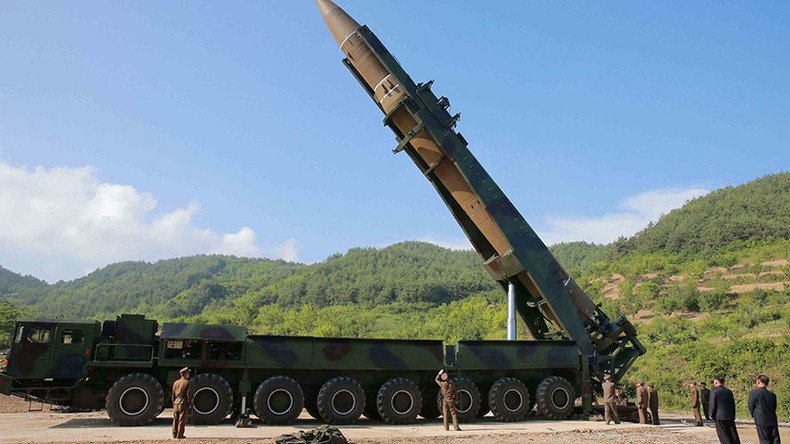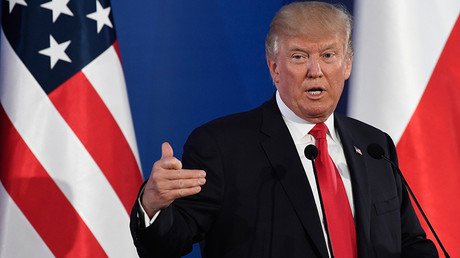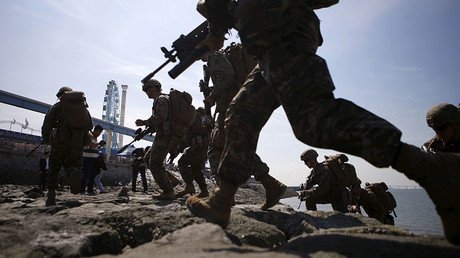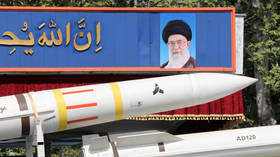Russia denies ‘blocking’ UNSC statement on N. Korea missile test, condemns leak & misinterpretation

Reports of Moscow “blocking” the US-drafted condemnation of the recent North Korean missile launch are false, Russia’s United Nations mission has clarified in a statement, while condemning the leak and media misinterpretation of internal UN conversations.
The claim that Russia allegedly “blocked” the draft Security Council statement was reported earlier on Thursday by Reuters, which cited unnamed diplomats who leaked an internal email conversation between Russian representatives to the UN and their “Security Council colleagues.”
“The rationale is that based on our (Ministry of Defense’s) assessment [that] we cannot confirm that the missile can be classified as an ICBM,” the email reads as cited by Reuters. “Therefore we are not in a position to agree to this classification on behalf of the whole council since there is no consensus on this issue.”
The office of the Permanent Representative of Russia to the United Nations has confirmed the authenticity of the leaked conversation, adding, that it indeed could not agree with the text classifying the projectile fired by Pyongyang earlier this week as an intercontinental ballistic missile (ICBM), as data provided by Russia’s Defense Ministry indicated that it was likely a mid-range ballistic missile.
“Based on this information, Russia has proposed the US, as authors of the initiative, to make certain amendments to it,” the statement reads.
The leaked email exchange, Russia stressed, was a part of a routine negotiation over a document, and therefore could not be described as “blocking.”
“We’d like to stress that it was a regular process of negotiation a Security Council document, which, as far as we know, was not interrupted by anybody. So saying that Russia 'blocked' the adoption of the statement would be bending the truth,” the statement reads.
Russian representatives, however, strongly condemned the leak of internal UN correspondence to the media.
“Citing such documents in open sources is at the very least perplexing,” the statement reads. “Unfortunately, we again witness how disgraceful steps of certain UNSC members, who resort to deliberate leaks, undermine the decades-old culture of cooperation within the UN Security Council.”
Following the Russian UN mission’s complaint, Reuters quietly amended the article to read that Moscow “objects” instead of “blocks” the US-drafted statement.
Pyongyang conducted the most recent ballistic missile test on July 4, claiming it was a successful launch of its first intercontinental ballistic missile, Hwasong-14, which is capable of carrying a “large, heavy nuclear warhead.” After the launch, the missile flew some 933 km in 39 minutes, reaching an altitude of 2,802 km, North Korean state television reported.
The US and South Korea, initially reluctant to confirm the tested projectile was intercontinental, eventually lent credibility to Pyongyang’s claim by voicing strong condemnation of the “escalatory ICMB test,” and taking the issue to the UN Security Council.
According to the Russian Defense Ministry data, however, North Korea launched an intermediate range missile (IRBM), which flew some 535 kilometers, reached an altitude of 510km, and fell into the Sea of Japan.
Instead of trying to “strangle” Pyongyang with additional sanctions which could result in an unpredictable outcome, Russia and China proposed a roadmap to deescalate tensions in the peninsula by launching constructive negotiations through a simultaneous halt of Pyongyang’s nuclear program and a suspension of US-South Korean military activity.
Russia, China: N. Korea must freeze nuclear activities, US halt THAAD deployment https://t.co/rzcmFi0N9Bpic.twitter.com/Rydu9tdo3r
— RT (@RT_com) July 4, 2017
Washington, however, swiftly rejected the proposal, saying, that joint drills with Seoul have taken place since the 1950s and that “we do these kinds of exercises and have relationships like this all over the globe.”
Despite the joint Russian and Chinese plea not to escalate tensions any further, the US and South Korea rushed to flex their muscles in the wake of Pyongyang's latest missile test. Within two days, the allies conducted two sets of live fire drills on the Korean peninsula.
US & S. Korea launch tactical missiles to show capabilities to North Korea https://t.co/d794oXKlTgpic.twitter.com/qq7LLcrK1Z
— RT (@RT_com) July 5, 2017
On Thursday, the South Korean navy and air force simulated an attack in the Sea of Japan during a drill which involved 15 warships as well as Lynx helicopters, P-3C Orion surveillance aircraft and FA-5, F4E and KF-16 fighter jets.
On Wednesday, Washington and Seoul launched several surface-to-surface tactical missiles into neutral waters as a show of force, demonstrating its “deep strike precision capability” to North Korea.














